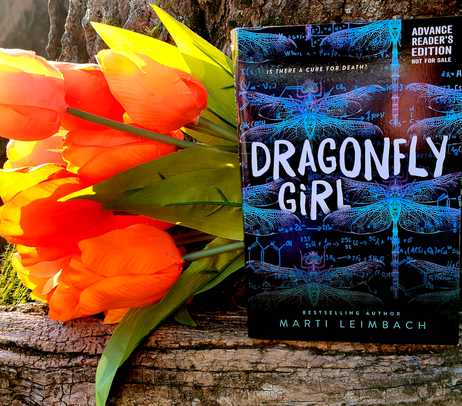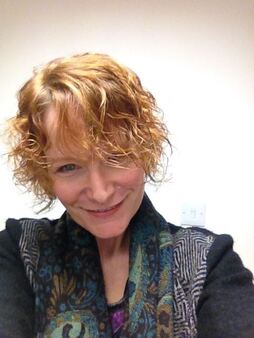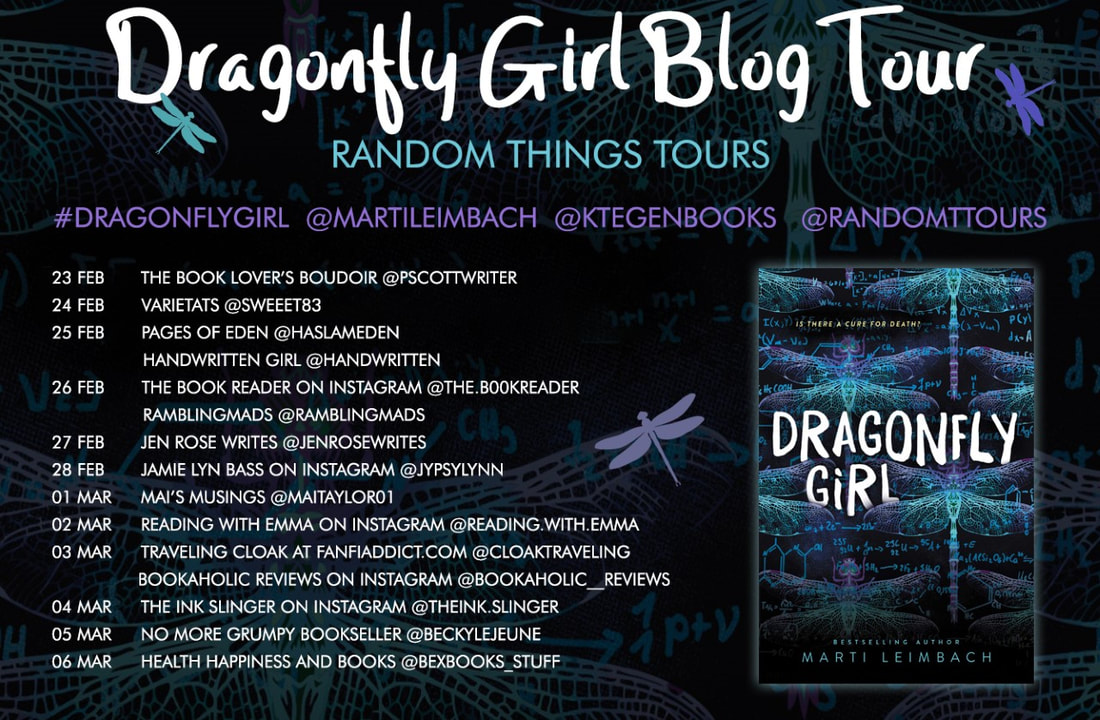|
Continue below to read my review of the book, my interview with the author, and be sure to check out the rest of the stops on the 'DRAGONFLY GIRL' blog tour brought to you by RANDOM THINGS TOURS, KATHERINE TEGEN BOOKS, and MARTI LEIMBACH!

'Dragonfly Girl' is the YA debut from Marti Leimbach, the bestselling author of titles such as 'The Man from Saigon,' 'Daniel Isn't Talking,' and 'Dying Young,' the latter of which was her first book.. made into a film starring Julia Roberts. What a way to start a career in writing!
While 'Dragonfly Girl' is her first YA novel, due to her experienced hand in the industry, it's absolutely fluid. A science-based thriller, the story focuses on a brilliant teen named Kira Adams. Though she struggles with some school subjects, her mind works like a well-oiled machine when she has equations in front of her. At home, her widowed mom is very ill.. and that leaves Kira trying to manage the household and their ever-crushing debts. At school, she's awkward and shy, bullied by other students, and just trying to keep her head down as much as possible. When she wins an international science award, she draws the attention of a number of powerful people both in and out of the science community. But some of those people are incredibly dangerous and caught up in the spotlight of acclaim, Kira may discover too slowly which she can trust. Admittedly, in the first two-thirds of the novel, I have never been so engaged in a story. This was a girl I could relate to in a unique way. She's able to rise through the ranks of her chosen profession with ease, despite lacking certain things that are expected. Those around her are baffled, even jealous.. at how easily she succeeds without the experience they have worked for years to gain. Actually, that's my favorite part of this story. Leimbach somehow manages to capture and convey a meteoric rise that society says shouldn't be possible. Kira thinks little of what she lacks at first, she just gives it a try. Only after winning the contest, does that doubt begin to creep in.. and even then, it's not about her abilities.. it's about the reactions those around her may have upon realizing. In truth, I wish the story had continued along this trajectory for my personal taste, but I recognize that such a move would have limited the scope far too much. While I felt like the turns taken were unnecessary and even a bit over the top for me, not because they're unreasonable possibilities.. but rather because everything combined together felt extremely unlikely, the plot twists did take it to new dimensions. As for the characters, Kira is kind of adorable and Lauren is a really good, loyal friend. Again, tying together everything about Lauren makes her seem a bit out of this world, but suspension of disbelief engaged.. she's amazing. Dmitry was probably my favorite. Quite quickly his voice and his mannerisms developed in my mind as I read him. He was the most visceral for me and as such, I couldn't get enough of his appearances.. disheveled as they may be. Plenty of intrigue and surprises make the book a page-turner. Overall, though Kira swings through a somewhat unlikely social learning curve very quickly toward the end, I still deeply enjoyed the journey and couldn't recommend the book highly enough.
Add to Goodreads
PURCHASE LINKS: AMAZON | BARNES & NOBLE | BOOK DEPOSITORY | BOOKSAMILLION | GOOGLEPLAY BOOKS | INDIEBOUND | INDIGO | KOBO 
ABOUT THE AUTHOR
Marti Leimbach's latest novel is DRAGONFLY GIRL, a YA action/thriller about a high school girl with a gift for science who discovers a "cure" for death and ends up embroiled in an international rivalry. It is published by Harper Collins in February 2021. Marti Leimbach is known for her bestsellers, Dying Young, made into a film starring Julia Roberts, and Daniel Isn't Talking. She is interested in neurodiversity and has shared the stage with young inventors at the Human Genome Project (Toronto), the National Autistic Society, and the University of Oxford. She teaches on the Masters Programme in Creative Writing at the University of Oxford. Dragonfly Girl is her eighth novel, but her first for young adults. ☆★☆ Interview with Marti Leimbach ☆★☆
I read that you participate in the Masters Programme in Creative Writing at the University of Oxford. What motivates you to teach?
I absolutely love the students! These are often young writers at the start of their literary lives and they’ve got such enthusiasm. We teach in “residencies” throughout the academic year and I always come away from a residency fired up and freshly motivated to write, myself! I understand your interest in neurodiversity was inspired by your experience as a mother. What do you feel is the greatest misconception or misrepresentation about neurodiversity? People with autism or attention deficit disorder or tourettes, for example, are not massive anomalies but are part of the world, and my family is just another example of this truth. Both the family I was born into as well as my family now make up a very neurodiverse bunch. My son has taught me the most, however, because he can’t easily pass as neurotypical. Also, while he’s terrifically smart and gifted in some ways, he’s very vulnerable both socially and economically due to his autism. I believe in the necessity of embracing neurodiversity, of pushing for working conditions that make it possible for a much larger range of people, especially those on the autistic spectrum. One misconception is that people with ASD aren’t able to contribute as much as a neurotypical person. That is just not the case for a number of reasons. For example, a diversity of viewpoints from differently-abled people enhance decision making at a corporate level. What's the most interesting thing you've learned as you've developed your interest in science? The sheer rate of change is breathtaking. If I think about the speed with which vaccinations for Covid19 were developed, for example, I get a bit teary-eyed knowing I’m witnessing a true medical miracle that will save tens of thousands of people. On your site, I noticed you broached the subject regarding the demographic gaps between students who enter STEM fields.. the correlations between gender, class, race and ethnicity.. and the theories about how the subconscious mechanism may trigger some students to enter other fields instead due to the persistent masculine imagery we see with science and mathematics. Did this directly influence your work on Dragonfly Girl? And were you hoping to help affect a change through your story or is that just a happy bonus to the story you wanted to tell? I didn’t set out purposely to challenge the perception that scientific settings are the domain of white men. It was only once Kira was working after school in a laboratory that the question of demographics came up naturally. It’s as though I discovered the incredible bias inside science communities through my character. Having done that, however, I could see the value of a girl like Kira, her friend Lauren, and the women scientists in the novel in providing fictional role models for girls who may wish to study or pursue careers in STEM. Kira, herself, has role models of real life women scientists, her declared favourite being Barbara McClintock, an American scientist and cytogeneticist who was awarded the 1983 Nobel Prize in Physiology or Medicine. There's a recurring theme across a few of your books that centers in and around a caretaker perspective. Does that come from a personal place, like your relationship with your son or is it just a story you find yourself drawn to? I will concede to a mild preoccupation with the role of caretakers, whether that be in a traditional manner in which we imagine caretakers, or in the way we care about each other generally. For example, in Dying Young, Hilary is in love with a young man who is foregoing treatment for a terminal condition and for whom she is sole caretaker. In Daniel Isn’t Talking, a young mother is doing her best to serve the needs of her family, especially her young son with autism, to the extent that she often neglects her own self-care. In Dragonfly Girl, Kira’s actions are highly motivated by her physical and financial responsibility to her mother, who is ill. I’ve been in two of these scenarios in my real life, so I suppose it just sticks with me. Though Dragonfly Girl does seem to have a similar theme to your other work, I see that it's your first foray into YA. Was this your intent or did you happen to find yourself there when the story was done? I read YA because I like it but I hadn’t imagined writing YA until I happened upon Kira’s story in Dragonfly Girl. It just came to me one day like a fully formed idea implanted in my brain. I am very excited about working in the young adult space! What's the most important thing you'd hope readers will take with them after finishing Dragonfly Girl? I want young people to know that they don’t have to be good at everything. You can be good at one thing and make it your life’s work. And you don’t need a million friends to be happy, either. One or two close friends is enough. If you stay true to yourself, you’ll find your tribe. Oh, and it’s from this place that true romantic love might take hold, too! With Dragonfly Girl releasing February 23rd and the manuscript already finished for the sequel, Academy One.. what's next for you? While it’s true that Academy One is in a completed form, I always sit on a book for a little while to make sure it’s what I want. I’ve already decided to make two big changes in Academy One, both of which involve the love interest. Your career is so robust after several books and over 30 years in the publishing industry. What would you tell yourself.. if you could go back to the period prior to your first novel and offer advice? I would tell myself to do the best with that which is under my control – writing well and consistently. I would celebrate small wins and let go of all losses. I’d insist that I took the time to make more friends with other writers, not just my students but my colleagues out there, somewhere, proofreading their galleys and trying to get noticed in such a crowded marketplace. The best feeling in the world is when you help another person achieve their dream of publication, or even bestseller status. I would do more of that. I would tell myself not to worry and that your readers will always find you. And some of these readers will give you some seriously excellent advice that may help you as much or more than you can imagine. There is always another book inside you. There is always another day.
0 Comments
Leave a Reply. |
Archives
November 2023
|





 RSS Feed
RSS Feed